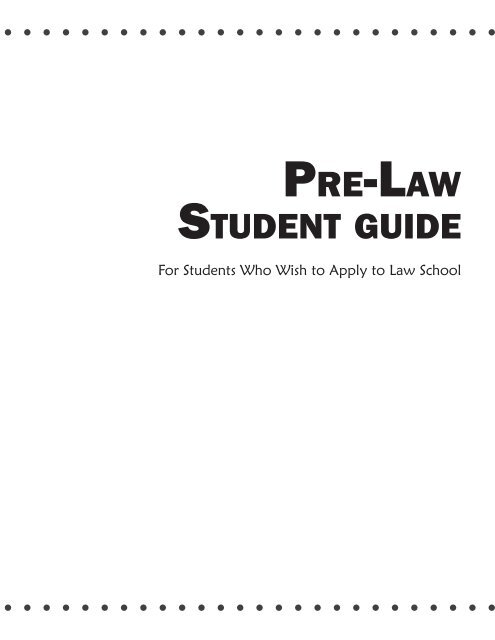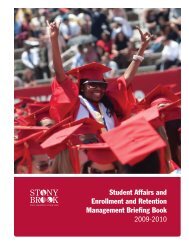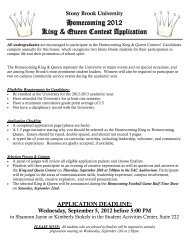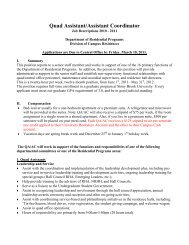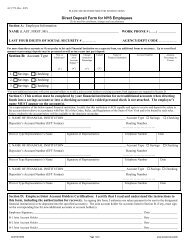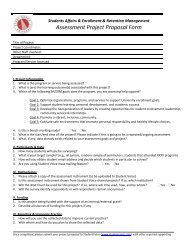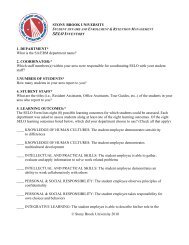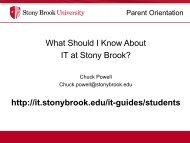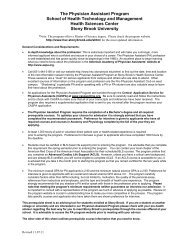PreLaw Guide - Student Affairs - Stony Brook University
PreLaw Guide - Student Affairs - Stony Brook University
PreLaw Guide - Student Affairs - Stony Brook University
Create successful ePaper yourself
Turn your PDF publications into a flip-book with our unique Google optimized e-Paper software.
Pre-Law<br />
<strong>Student</strong> guide<br />
For <strong>Student</strong>s Who Wish to Apply to Law School
Pre-Law Advising<br />
Who is this booklet for<br />
This booklet is designed for those tudents who wish to apply to law school.<br />
Who are we<br />
Pre-Law Advisors<br />
Lauren Byrnes, Pre-Professional Advisor<br />
Lakshmi Ramsoondar, Assistant Director, Pre-Professional Advising<br />
James Montren, Associate Director, Pre-Professional Advising<br />
Contact Information:<br />
Academic <strong>Affairs</strong>, Pre-Professional Advising<br />
Location: E-3310 Melville Library<br />
Phone: (631) 632-7080<br />
Email: advising@stonybrook.edu<br />
Website: www.stonybrook.edu/prelaw<br />
Advising Hours:<br />
Appointments available Tues, Thurs & Fri (9 a.m. - 5 p.m.)<br />
Walk-in Advising available Mondays (2 - 4 p.m.) & Wednesdays (10 - 12 noon & 2 - 4 p.m.)<br />
What pre-law services do we provide<br />
• We meet individually with applicants needing advice.<br />
• We sponsor programs that educate students on the law school application process as well as<br />
other special topics relating to career interests in law.<br />
• We complete Dean’s Certifications for schools requesting them.<br />
• We produce and distribute a bi-weekly “Please Be Advised” e-mail that includes pre-law advising<br />
information.<br />
For Freshmen<br />
If you are a freshman you should contact your Undergraduate College advisor to discuss your prelaw<br />
plans.<br />
p 1
Planning Your Courses<br />
Picking a Major<br />
There is no preferred major for undergraduates<br />
seeking entrance to law school.<br />
You should pursue the subject you enjoy<br />
and can perform well in.<br />
You should consider taking one or more<br />
of the 3-credit law-related courses listed<br />
below during your studies at <strong>Stony</strong> <strong>Brook</strong>.<br />
To read the course description for each<br />
class below, visit www.stonybrook.edu/<br />
ugbulletin.<br />
G/P/NC and Withdrawal Options<br />
It is important to discuss the G/P/NC and<br />
Withdrawal options for any class with<br />
an advisor before making that decision;<br />
however, this is especially important if you<br />
are looking to apply to law school. You<br />
should avoid a pattern of such remarks on<br />
your transcript. Professional schools may<br />
interpret this as indicating poor judgment,<br />
bad planning, or the inability to finish<br />
what you begin. If you receive an “NC”<br />
for a course this will be factored into your<br />
LSAC GPA as an “F” when applying to<br />
law school. For more information, please<br />
speak with a pre-law advisor.<br />
Maintaining and Balancing Your<br />
Schedule<br />
There are no substitutes for good grades.<br />
Anything which impairs your ability to<br />
earn good grades in challenging courses<br />
may ultimately cost you in terms of time<br />
and lost opportunities. Take on courses<br />
and experiences that you enjoy but that<br />
will also result in success.<br />
ECO<br />
Law<br />
345:<br />
Related<br />
Law and<br />
Courses<br />
Economic<br />
@<br />
Issues<br />
<strong>Stony</strong> <strong>Brook</strong> <strong>University</strong><br />
Prerequisite: C or higher in ECO 303<br />
HIS 320: European Natural Law to Global Human Rights<br />
Prerequisite: U3 or U4 standing<br />
Advisory Prerequisite: HIS 102 or 104<br />
HIS 371: Law and Society in American History, 1620 – 1877<br />
Prerequisite: U3 or U4 standing<br />
HIS 372 -K & 4: U.S. Constitutional History and Civil Rights<br />
Prerequisite: U3 or U4 status<br />
HIS 373 -F: History of Crime and Criminal Justice in the U.S.<br />
Prerequisites: U3 or U4 status; HIS 104<br />
JRN 220: Media Law and Ethics<br />
Prerequisite: JRN 110<br />
POL 311: Introduction to International Law<br />
Prerequisite: U3 or U4 standing<br />
POL 319: Business Law<br />
Prerequisite: U3/U4 standing or new transfer student<br />
POL 320-F Constitutional Law & Politics: United States<br />
Prerequisites: POL 102 or 105, U3 or U4 standing<br />
POL 328 - F: Criminal Law<br />
Prerequisite: U3 or U4 standing<br />
Advisory Prerequisite: POL 320<br />
POL 330/WST 330-K: Gender Issues in the Law<br />
Prerequisite: U3 or U4 standing<br />
Advisory Prerequisite: POL 102 or 105, or WST 102<br />
POL 332 - F: Politics of Criminal Due Process<br />
Prerequisite: U3 or U4 standing<br />
Advisory Prerequisite: POL 102 or 105<br />
POL 333: Environmental Law<br />
Prerequisites: ECO 108; POL 102<br />
PHI 108 - B: Logical and Critical Reasoning (II)<br />
Prerequisite: Open to freshmen & sophomores, & to<br />
juniors and seniors who have not completed DEC B<br />
PHI 220 - C: Introduction to Symbolic Logic (II)<br />
Prerequisite: Satisfaction of entry skill in mathematics<br />
requirement<br />
Advisory Prerequisite: U2 standing or one course in<br />
philosophy<br />
WRT 381: Advanced Analytic and Argumentative Writing<br />
Prerequisite: Completion of D.E.C. category A<br />
p 4
Law School Timeline<br />
The following checklist presumes law school entrance in the fall following graduation from <strong>Stony</strong><br />
<strong>Brook</strong>. The schedule can be condensed, but applications need to be made approximately ten months<br />
in advance of fall matriculation at law school, and an additional three to six months of concentrated<br />
study for the Law School Admission Test (LSAT) is necessary to maximize your score.<br />
Freshman and Sophomore Years<br />
Learn, Explore, Study, and Earn Good Grades!<br />
• Attend seminars and informational meetings sponsored by the Academic & Pre-Professional<br />
Advising Center. Note that law schools do not look for any particular major or minor. It’s most<br />
important to study in a subject area that interests you, and one in which you will do well academically.<br />
• Join the <strong>Stony</strong> <strong>Brook</strong> Pre-Law Society. Visit their blog at http://www.stonybrookprelaw.blogspot.<br />
com/<br />
• Make every effort to adjust successfully to the academic rigors of college so that you can begin<br />
building a record of solid, positive academic achievement. A GPA of 3.0 or higher is your goal.<br />
The higher your GPA, the better. Stay focused on why you are in college and where you want to<br />
go.<br />
• Participate in at least one positive, enriching co-curricular activity on campus, especially one in<br />
which you demonstrate your leadership abilities.<br />
• Expand your vocabulary. In addition to maintaining good grades, read a good, current law-related<br />
novel every semester, read the New York Times every weekday, do a crossword puzzle (the<br />
Tuesday New York Times is a worthy goal). Sign up for the Merriam-Webster Dictionary Word of<br />
the Day (www.m-w.com) and/or Wordsmith - A Word A Day (e-mail: wsmith@wordsmith.org).<br />
Try to avoid being a TV addict; studying and general reading are far more productive and more<br />
like what you will be doing in law school.<br />
• Pursue internships and other opportunities to gain information and experience about careers in<br />
the legal profession.<br />
• Bookmark and review the Law School Admission Council (LSAC) website (www.LSAC.org).<br />
p 3<br />
Junior Year<br />
Obtain Recommendations, Research, Study, & Prepare to Apply!<br />
• Think about your decision to go to law school and if you are unsure, research other career options.<br />
Most law school students take time off between college and law school.<br />
• Pursue internships and other opportunities to gain information and experience about careers in<br />
the legal profession.<br />
• Discuss legal careers with friends and acquaintances who are attorneys. Informational interviews<br />
with attorneys are also helpful.<br />
• Set up a half hour appointment to speak with a Pre-Professional Advisor to review your academic<br />
progress and goals, as well as the details related to applying to law school.<br />
• Register with the Credential Assembly Service (CAS) at LSAC.org. Most law schools want two letters<br />
of recommendation, typically from faculty or employers. Begin having those writing recommendations<br />
submit letters on your behalf.<br />
• Begin serious investigation of law schools. Review law school websites. Look at each school’s<br />
profile in the Official <strong>Guide</strong> to ABA Approved Law Schools available for free on-line at LSAC.org<br />
and at the Academic & Pre-Professional Advising Center.
• Research law schools by exploring websites and law school catalogues. Visit law schools whenever<br />
you can.<br />
• Attend the fall law school fairs, particularly the NYC Law School Forum in September or the Boston<br />
Law School Fair, Copley Plaza, in late October. These are comprehensive events with many<br />
admissions deans/counselors present to answer your questions.<br />
• Pick up a free copy of the LSAT Registration Book in the Academic & Pre-Professional Advising<br />
Center. The LSAT is offered four times a year: June, October, December, and February.<br />
• Visit the LSAC.org site to get information on ordering practice exams. Investigate LSAT review<br />
courses and prepare thoroughly for the LSAT. Practice! Practice! Practice! Both Princeton<br />
Review and Kaplan are given on campus. There are other prep courses which can be helpful,<br />
including Cambridge and Home-Study. Check them all out if you need the extra help.<br />
• Begin writing your personal statement. Revise, revise, revise!<br />
• Review your <strong>Stony</strong> <strong>Brook</strong> transcript at the end of your junior year. If it is accurate, have the<br />
Registrar’s Office send an official transcript to CAS, and make the same request of each Registrar’s<br />
Office of previously attended colleges.<br />
Senior Year<br />
Research, Take the LSAT, & Apply!<br />
• Continue to visit law schools, especially those close to where you live.<br />
• Attend law recruitment days and other opportunities to meet with law school admissions officers.<br />
Revisit the NYC Law School Forum in September, or go to the Boston Law School Fair, Copley<br />
Plaza in late October.<br />
• Register with the CAS at www.LSAC.org if you have not done so already.<br />
• Select at least five law schools to apply to and discuss your choices with a Pre-Professional Advisor.<br />
• Take the LSAT if you have not yet already. LSAT exams are offered in June, October, December,<br />
and February.<br />
• Complete your application files with LSAT and the law schools by mid-November. Make sure<br />
you disclose everything required. Failure to do so can result in the automatic rejection of your<br />
application(s).<br />
• File your taxes early and submit your FAFSA in January. The FAFSA is available on-line beginning<br />
January 1.<br />
• Submit an updated transcript with your fall grades to LSAC and the law schools.<br />
• Expect to hear from law schools beginning in December through the spring. If you have been<br />
waitlisted at a school, consider forwarding NEW information to the law schools (i.e., fall semester<br />
grades, completion of a thesis, awards, additional recommendations).<br />
• Visit the schools where you have been admitted to or waitlisted.<br />
• Inform the Academic & Pre-Professional Advising Center and those writing letters of recommendation<br />
of the results of your law school applications. The Pre-Professional Advisors will be able<br />
to help if you have a problem.<br />
• Once admitted, send a deposit to reserve your space in the entering class. If you are no longer<br />
interested in the school, let them know early so they can offer your seat to someone else.<br />
• Before leaving school in the spring, have the Registrar’s Office send a final transcript to the law<br />
school which you plan to attend with your complete academic record and notice of graduation.<br />
p 2
LSAT: Law School Admissions Test<br />
The LSAT is offered in June, October, December, and February. Refer to www.LSAC.org or the inside<br />
cover of the current LSAT & CAS Registration & Information Book for more information about LSAT<br />
dates and registration deadlines. You may register on-line to take the LSAT. Register for the LSAT<br />
ASAP so that you have a better chance at being assigned your first choice test site!<br />
The best time to take the LSAT is when you are prepared! Preparing for the LSAT takes PRACTICE,<br />
PRACTICE, PRACTICE! Taking the LSAT in June is ideal because you will have your scores in time to<br />
apply “early action” to programs and if you need to cancel your June score, you still have time to<br />
take the October exam and have your applications completed at the schools by mid-November.<br />
However, do not plan to take the June exam as a “practice test”. Ideally, you only want to take this<br />
test ONCE! Many law schools average LSAT scores. Furthermore, law schools will question multiple<br />
score cancellations.<br />
LSAT Preparation Course<br />
Some applicants prepare alone or with a group by buying LSAT prep tests through LSAC.org or other<br />
LSAT books on the market. They find that this works for them. Others determine that they need the<br />
structure of a class to help discipline themselves to prepare for the exam or they need help with a<br />
particular section of the exam. Many applicants also find that the insight and strategies for taking the<br />
exam they learn from the course are extremely helpful. Whether you decide to take an LSAT prep<br />
course or not, the key to doing your best is to PRACTICE, PRACTICE, PRACTICE under simulated<br />
LSAT conditions. Below is a listing of some companies that offer LSAT prep courses. Many of the test<br />
companies offer scholarships for applicants with financial need.<br />
Inquire with each company.<br />
• Binary Solutions – www.binarysolution.com<br />
• Kaplan - www.kaptest.com<br />
• Princeton Review - www.princetonreview.com<br />
• TestMasters - www.testmasters.com<br />
Canceling Scores<br />
Applicants may cancel their scores at the test site or via written requests received by LSAC within six<br />
(6) calendar days of the test.<br />
Testing Accomodations<br />
LSAC will provide accommodations for individuals who have documented disabilities. Please refer to<br />
the LSAC website at www.LSAC.org.<br />
p 9
Letters of Recommendation<br />
• A person who knows you well can write a more substantial and helpful letter than someone who<br />
hardly knows you. In choosing between a person who taught you in a small class versus someone with<br />
a famous name or title but who cannot write a personal letter, choose the former. Letters from graduate<br />
student instructors are acceptable.<br />
• When asking for the letter, make sure that you make an appointment to meet with the person whom<br />
you are asking. Don’t ask for a reference over email. Bring your resume, transcript, and tests/papers<br />
from classes taken with the faculty member and be prepared to talk about your future goals and past<br />
achievements. Applicants should include on their resume their current and permanent address, current<br />
and permanent phone number, <strong>Stony</strong> <strong>Brook</strong> ID number, e-mail address, education (including all colleges<br />
attended and study abroad experiences), GPA, honors and awards (describe them), extracurricular<br />
activities, skills, language proficiency, and employment history. A sentence/bullet point describing the<br />
nature of the experience should accompany each activity or experience and it should indicate start and<br />
end dates.<br />
• Make sure that you allow the person the option of saying NO. You want to have strong letters and if<br />
a person is somewhat uncomfortable writing for you or doesn’t have enough time, it is likely that the<br />
result will be short and weak. It is much better to have someone be honest with you at the start, so<br />
that you can find another person to write your recommendation who will be more enthusiastic.<br />
• Give those writing recommendations plenty of advanced notice and time to write a good letter of recommendation<br />
(a month or even two), but also give them a deadline. Make sure that they know your<br />
application timeline.<br />
• Give those writing recommendations the LSAC Letter of Recommendation form and a stamped envelope<br />
addressed to LSAC.<br />
• Should you waive my right to see the recommendation letters The general feeling is that the person<br />
writing your recommendation will be more candid if it is a closed letter. The choice is yours. You must<br />
either waive or not waive your rights to see all the recommendations as well as your Dean’s Certification.<br />
Write a thank you note following your initial request for the letter, thanking the individual for<br />
agreeing to write the letter.<br />
• What is the total number of recommendations I should submit LSAC will accept up to four letters of<br />
recommendation.<br />
• It is not necessary for those writing recommendations to write targeted letters to each law school. A<br />
generic law school recommendation letter is fine unless the school specifically requests otherwise. It is<br />
also not necessary to give those writing recommendations the school-specific recommendation forms.<br />
• Inform your writers when you have decided where you will be attending school and thank them again<br />
for their assistance and support.<br />
p 10
Applicant Information<br />
Credential Assembly Service (CAS)<br />
Almost all ABA approved law schools require that applicants register with the Credential Assembly Service<br />
(CAS). CAS provides a centralized and standardized report to each law school where you apply that<br />
includes the following:<br />
• Undergraduate academic summary<br />
• Copies of all undergraduate, graduate, and law school/professional transcripts<br />
• LSAT scores and writing sample copies<br />
• Copies of letters of recommendation processed by LSAC<br />
CAS also provides applicants with the following services:<br />
• Ability to track LSAC file status and electronically file law school applications<br />
• Recommendation service active for five years<br />
• Great resources available for purchase and for FREE<br />
• ABA-LSAC Official <strong>Guide</strong> to ABA-Approved Law Schools - Free On-line Edition<br />
Applicants may register with CAS anytime. You do not have to register at the time you register for the<br />
LSAT, but you will want to register with CAS before you submit your applications to the schools. Your<br />
registration is good for five years. You can register on-line at www.LSAC.org.<br />
Law School Reports<br />
Once LSAC has summarized your transcripts, you will be able to view your CAS Law School Report on-line.<br />
It is important that you check it for accuracy. If there are errors, you will need to write to LSAC to have<br />
it corrected. Refer to the LSAT and CAS Registration and Information Book for more information. No.<br />
Instead, you order the number of CAS Law School Reports that corresponds to the number of law schools<br />
that you are applying to. When the law schools receive your application, they request your law school<br />
report from CAS.<br />
Fee Waivers<br />
LSAC offers fee waivers for both the LSAT and CAS. More information is available in the LSAT & CAS Registration<br />
and Information Book or on-line at www.LSAC.org<br />
Transcripts<br />
You must have a transcript sent to LSAC from each undergraduate and graduate school you have attended.<br />
Request your <strong>Stony</strong> <strong>Brook</strong> transcript from Registrar and make sure to give them the CAS Transcript Request<br />
form found in the form. This form is not required, but the form will serve to expedite the matching of<br />
your transcript to your CAS file. We recommend submitting transcripts over the summer because CAS experiences<br />
a backlog in the fall. Applicants currently in school should wait until they receive their spring (or<br />
summer) grades. Applicants in school this coming fall should send their updated transcript to LSAC and to<br />
the individual schools as soon as all their fall grades are in.
Dean’s Certification<br />
What is a Dean’s Certification<br />
A Dean’s certification is a summary statement of a student’s academic history. It verifies for the law schools<br />
whether an applicant has had any academic or disciplinary sanctions and includes a brief statement about<br />
your <strong>Stony</strong> <strong>Brook</strong> academic performance, extracurricular activities, and campus service. Your resume or a<br />
list of your activities helps us to write the statement.<br />
• Pre-Professional Advisors write certifications for seniors and alumni/ae.<br />
• Some schools do not require a Dean’s Certification. Check the application materials of the schools you<br />
are applying to.<br />
• The Dean’s Certification is not considered a recommendation letter. The writer does not need to<br />
know or meet with the applicant.<br />
• Applicants who transferred to <strong>Stony</strong> <strong>Brook</strong> from another college or university must also have their<br />
previous schools submit Dean’s Certifications to the law schools as well.<br />
• The Academic and Pre-Professional Advising Center needs at least one week advance notice to send out<br />
a Dean’s Certification Form. They are written in the order received from applicants.
Personal Statement<br />
The purpose of the personal statement is to gather information about you outside of your academic performance,<br />
LSAT score and extracurricular involvement. Think of it as a written interview, one where you<br />
have control of the questions and answers. The most important consideration in your personal statement,<br />
no matter what the topic, is the impression of yourself that you are creating. The personal statement is<br />
your opportunity to distinguish yourself.<br />
Possible Topic Areas<br />
• Your motivation for a career as a law professional<br />
• The influence of your family/early experiences on your life<br />
• The influence of extracurricular, work or volunteer experiences on your life<br />
• Personal philosophies as related to your goals<br />
• How you’ve overcome an obstacle or disadvantage<br />
Before You Begin<br />
• Brainstorm<br />
• Engage in self-reflection exercises<br />
• Free-write<br />
• Decide your approach in terms of content<br />
• Think about your readers and tailor your message<br />
• Write an outline<br />
Writing Process<br />
• Get started writing 1st draft<br />
• Revise, Revise, Revise<br />
• Obtain feedback from others<br />
• Proofread<br />
General Advice<br />
• Answer the questions that are asked. Don’t use the same statement for all applications.<br />
• Tell a story. Show or demonstrate your points using concrete examples from your experience.<br />
• Be specific. Broad sweeping statements will not make you stand out as an individual. Illustrate your<br />
points with personal examples or experiences.<br />
• Find an angle. An angle helps you to focus and make your statement interesting.<br />
• Have a strong opening paragraph. Your first paragraph should state your thesis and grab the reader’s<br />
attention.<br />
• Avoid clichés and quotes. This statement is about you and should not borrow from other’s words.<br />
• Write well. Be meticulous about your writing style. Type and proofread your essay very carefully.<br />
• Don’t write a descriptive resume. This is a common mistake. Don’t restate your resume in prose. This<br />
information can be found in other parts of your application.<br />
• Avoid writing about high school experiences. Professional schools will expect that you have had significant<br />
experiences while in college.<br />
• Be positive. Don’t badmouth the profession.<br />
• Be honest.<br />
• Find a balance between creative and cautious. This can be tricky. There is a fine line between creative<br />
and interesting and odd and gimmicky. Don’t write your personal statement as a legal brief or as a<br />
poem.<br />
• Be concise. This is greatly appreciated by those who are reading thousands of applications.<br />
• It’s hard to be a stand-up comedian. Humor is difficult and can be misinterpreted. It’s best to avoid it.
Tips for Writing Your Best Law School Personal Statement<br />
1. Your personal statement should give a sense of who you are – your values and passion, but don’t beg<br />
for admission!<br />
2. Law schools want to know who you are – not the specialty area that interests you. Law schools want<br />
you to be open to all areas of law.<br />
3. Your personal statement is a substitute for the interview. Law schools deliberately do not have interviews<br />
because they expect applicants to utilize the English language, since the written word is an<br />
important part of being a lawyer. Use the essay to write about what you would have said in the interview.<br />
Here’s an example: If you had 5 minutes to make a pitch about yourself in an interview, figure<br />
out what you would say, speak into a tape recorder, play it back, and write about it.<br />
4. Don’t use your personal statement as a time to review your resume and waste valuable space! Keep<br />
your personal statement limited to what has been stated on the application.<br />
5. Your statement should be personal and self-revealing, but not maudlin. Use good judgment by not<br />
writing something too personal. Your statement must sound like you, not like a legal brief; it can have<br />
a “chatty” tone, but should be written in your own voice.<br />
6. Let the reader in on the process. For example, explain why you did something, or what caused you<br />
to make a change in life circumstance, or what led you to law school. You should lay out the process<br />
in your statement – include anecdotes, how you problem-solved, what you expected, and what you<br />
learned about yourself. The reader should be able to understand how your mind works, and how you<br />
came to a particular conclusion, without giving every detail. Engage the reader and lead the reader to<br />
the conclusions you want; in other words, “show, don’t tell”.<br />
7. Use good judgment. Don’t be too intimate in your statement; use discretion – it is a balancing act.<br />
Everything you write about must be true, but you don’t have to tell everything about you!<br />
8. Don’t name traits – describe them. For example, instead of saying you are hard working, provide<br />
an example or evidence for your claim. (i.e., “I was studying so hard, I was locked overnight in the<br />
library.”) Tell a story that highlights the traits you want someone to learn about you.<br />
9. Always be positive in your personal statement. Even if you are writing about something sad, end your<br />
story on a positive note (i.e., turning your life around.)<br />
10. Your personal statement should be non-speculative. You should stick to writing about the past and the<br />
present. Let the law schools draw their own conclusions about your future.<br />
11. Pick a story (or two related stories) that most define you. The story should be distinctive so that it<br />
gives you a “label” as a candidate. You want the law school to REMEMBER you as “the candidate<br />
who wrote about [something good and memorable]”. Your essay should be prosaic, and constructed<br />
around a metaphor, theme, or label. It should be written in-depth enough so that it says something<br />
important about you. Law schools want classic prose – write intellectually acute – not cute!<br />
12. Seek feedback on your personal statement from trusted friends, faculty, and pre-professional advisors.<br />
The Six Biggest Errors in Writing Your Personal Statement<br />
1. Having spelling and grammar errors. Don’t rely on spell check to catch everything!<br />
2. Having a statement in your essay that reads “I really want to go to Duke Law School”, but sending it in<br />
an envelope to Northwestern <strong>University</strong>.<br />
3. Putting your resume information in your personal statement.<br />
4. Focusing on your weaknesses, whining, and giving excuses.<br />
5. Writing a personal statement that is too cute – for example, starting with a famous quote, using a crazy<br />
font, or printing it on pink paper or with green ink.<br />
6. Writing a personal statement that is not personal at all or lacks any self-revelation.
Law School Selection Strategies<br />
(Adapted from Cornell's Legal Careers <strong>Guide</strong>)<br />
With 186 accredited law schools in the United States, how do you decide where to apply and ultimately<br />
where to attend It will be important to balance factors that address your personal preferences with those<br />
that affect your chances of admission. Do not let the search for "long shots, good chances, and sure things"<br />
govern your selection process. Begin by assembling a list of law schools based on criteria that are important<br />
to you, then revise your choices according to your chances of admission. This systematic approach<br />
should help limit frustration and confusion during the process of applying to law school. Selecting schools<br />
carefully will help reduce the time and expense of applying to an excessive number of schools.<br />
Criteria for Selection<br />
Consider the following factors and determine which are important to you:<br />
National/Regional Schools: Does the school attract applicants from across the country and abroad Or<br />
do most students come from the region in which the school is located Where do most students want to<br />
work following graduation—throughout the country or in the school's region<br />
Faculty: What are the academic and experiential backgrounds of faculty How accessible are they What<br />
is the faculty-student ratio, the number of full-time vs. adjunct faculty, and the number of female and minority<br />
faculty<br />
Facilities and Resources: Is the school affiliated with a university Do students have access to courses<br />
from a range of academic disciplines to supplement their legal curriculum Is the library large enough to<br />
accommodate holdings and permit students to conduct research and study How helpful is the library<br />
staff How accessible are electronic databases such as Lexis and Westlaw In general, do the facilities provide<br />
a comfortable learning environment<br />
<strong>Student</strong> Body: What is the size of the entering class What does the admissions profile tell you about the<br />
quality of the student body Where did students study as undergraduates and what are their geographic<br />
backgrounds Does the student body reflect a diversity of interests and personal/cultural backgrounds<br />
What is the overall atmosphere—are students friendly or overly competitive Is there much interaction<br />
with fellow students outside the classroom<br />
Special Programs: What coursework is available in specialized areas Are there any joint degree programs<br />
of interest to you available What are the opportunities for practical experience, including clinics,<br />
internships, etc. What specialized institutes, journals, or organizations exist in your areas of interest Does<br />
the school demonstrate a commitment to women and minorities through special programs<br />
Placement: What advising and resources are available to help you find a job Is career counseling available<br />
How many employers recruit at the law school and who are they What percentage of the class has<br />
positions at graduation In what types of positions and geographic areas are they employed What is the<br />
percentage of graduates holding judicial clerkships What assistance is given to students not interested in<br />
working in law firms What is the bar passage rate for recent graduates<br />
<strong>Student</strong> Life: Is housing provided for first-year students If not, does the school offer assistance in locating<br />
off-campus housing Is the school located in a safe area Is the location rural or urban What is the cost of<br />
living What types of cultural opportunities are there Does the school provide recreational facilities<br />
Costs: What are tuition, housing, and transportation costs Is financial aid exclusively need-based, or are<br />
merit scholarships available<br />
p 7
Reputation<br />
The issue most often discussed by prospective law students, yet the most difficult to define, is “reputation”.<br />
A number of factors contribute to a school’s reputation, including faculty, facilities, career services, reputation<br />
of the parent university, etc. Though a number of law school rankings are available, most factors<br />
evaluated are not quantifiable, and therefore you should not perceive the rankings as accurate or definitive.<br />
Selectivity at law schools, however, is one factor which can be quantified; you can gauge a school's relative<br />
selectivity by comparing the number of applicants accepted to the overall number of applications. The Official<br />
<strong>Guide</strong> to U.S. Law Schools and the Official American Bar Association <strong>Guide</strong> to Approved Law Schools<br />
contain charts and tables of recent admissions cycles at most schools, reflecting the level of selectivity.<br />
Schools can be divided roughly into three groups:<br />
• Schools with national reputations which tend to appear in various "top ten" lists. They draw students<br />
from a national pool and offer geographic mobility to graduates.<br />
• Schools with good regional rep utations which are attended primarily by students from the region, who<br />
may want to remain in the area following graduation, but who may also seek positions throughout the<br />
country.<br />
• Local schools which draw students primarily from the immediate area who want to practice there following<br />
graduation.<br />
For a more detailed discussion of law school reputation, refer to The Official <strong>Guide</strong> to U.S. Law Schools.<br />
Non-Traditional Alternatives<br />
You should be aware that some law schools offer alternatives to fall admission in a full-time law program.<br />
Evening divisions and part-time programs make it possible for students to work and study law simultaneously,<br />
earning a J.D. in four years. A few schools on the quarter system allow students to enter mid-year. Summer<br />
entry and/or summer courses can accelerate the degree program from three to two-and-a-half calendar<br />
years. And finally, some law schools have created summer trial programs, which allow applicants who may<br />
need additional preparation to ready themselves for legal study in time for fall entrance.<br />
Publications and Online Resources<br />
The ABA-LSAC Official <strong>Guide</strong> to ABA-Approved Law Schools is available for applicants to review in the<br />
Academic and Pre-Professional Advising Center. It's also available on-line at LSAC.org. Applicants can order<br />
the <strong>Guide</strong> on-line from LSAC.org or from Barnes & Noble and Amazon.<br />
Catalogs and bulletins published and distributed by law schools are available by contacting the schools by<br />
phone, by U.S. mail, or through their web sites.<br />
The Boston College Online Law School Locator helps applicants identify schools where their LSAT score and<br />
grades are most competitive for admission. www.bc.edu/LawLocator.<br />
School Visits are extremely important in helping an applicant determine if the school is the "right fit" for him<br />
or her. Each school has its own culture. It's intangible but you can feel it during a visit. Do not make your<br />
decision of where to attend law school solely on ranking and prestige.<br />
p 8
Pre-Professional Advising<br />
<strong>Stony</strong> <strong>Brook</strong> <strong>University</strong><br />
E-3310 Melville Library<br />
<strong>Stony</strong> <strong>Brook</strong>, NY 11794-3351<br />
Telephone: 631-632-7080<br />
Fax: 631-632-9259<br />
Web: www.stonybrook.edu/prelaw<br />
Email: advising@stonybrook.edu<br />
last updated 8/22/2013


